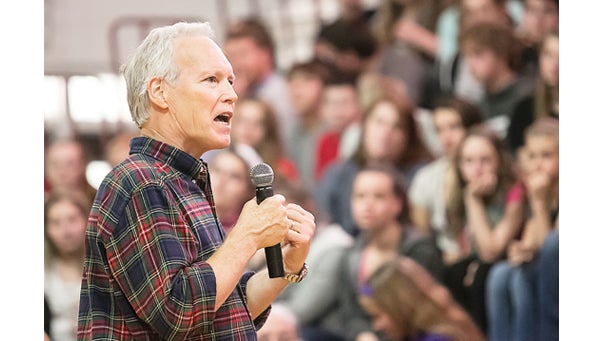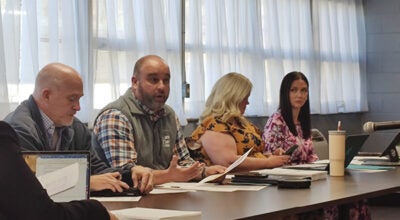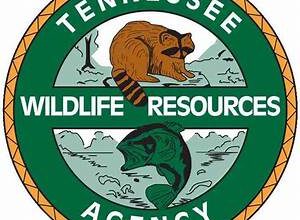RJ Reynolds’ grandson tells kids to say no to cigarettes
Published 9:45 am Tuesday, November 25, 2014

Photo by Brandon Hicks
Patrick Reynolds, an anti-smoking activist, spoke at Happy Valley Middle School on Monday afternoon. The grandson of tobacco magnate R. J. Reynolds, Patrick turned his back on his family business to take a stand against big tobacco companies.
Some local children received an important anti-smoking message Monday from someone many might consider an unlikely source: the grandson of the founder of one of the country’s largest cigarette manufacturers.
Patrick Reynolds, grandson of Richard Joshua “R.J.” Reynolds, spoke to students at Elizabethton High School and Happy Valley Middle School Monday. His appearance was part of a program from the Carter County Health Department using local tobacco settlement funds.
Reynolds told students about losing his father at a young age and his decision to turn his back on the family business.
He was the son of R.J. Reynolds Jr. and his second wife, actress Marianne O’Brien. Patrick Reynolds was 3 years old when his parents separated.
“I didn’t see him again for six years,” he said.
When he was 9, Patrick wrote a letter to his father saying he wanted to meet him, and eventually his father sent for him.
“I walked into the room, and there he was lying on the bed. I ran over and said ‘Daddy what’s wrong?’ He said ‘I’ve got asthma son,’ ” Patrick said. “Well, it wasn’t asthma. It was emphysema.”
“He was gasping for breath, and he was holding a cigarette in his hand,” Patrick said. “There was the son of R.J. Reynolds dying from the product that had made my family so much money.”
R.J. Reynolds Jr. died in 1964 at the age of 58. Patrick was 15.
“Tobacco took my father from me,” Patrick said. Patrick’s half-brother, R.J. Reynolds III, also died due to smoking, Patrick said.
When his grandfather started the R.J. Reynolds Tobacco Co. in 1875 in Winston-Salem, N.C., little was known about the effects of tobacco.
“He didn’t know how dangerous smoking was,” Patrick Reynolds said of his grandfather. “He was a good man who cared about the community.”
But over the years, the industry and the individuals involved changed, Patrick said. Tobacco companies began to lie about the contents of cigarettes and how addictive they were, he said, and the companies began to target children with their advertising.
Patrick Reynolds knows the tobacco addiction is real; he personally has struggled with it.
“I started when I was about 17 or 18,” Patrick said. He smoked for 17 years before he was able to overcome his addiction, he said.
“I was addicted,” he said. “I tried to quit 11 or 12 times. Smoking is addictive. Once you start smoking, you can’t stop.”
Along the way, he reached a point where he decided to turn his back on the industry that made his family a fortune.
In 1986, Patrick Reynolds became an anti-smoking activist and testified before Congress on cigarette advertising campaigns and industry regulations. He founded a nonprofit organization dedicated to anti-tobacco campaigning using the money he had gotten from his family’s business.
“I put my money where my mouth is,” Patrick said.
Now, nearly 30 years later, Patrick Reynolds still is involved in the movement for a tobacco-free society. He has appeared in advertisements by the American Lung Association on the dangers of smoking. As part of his activist work, he tours the country speaking to schools and other groups promoting a healthy, tobacco-free lifestyle.
At Happy Valley Middle School Monday afternoon, Patrick asked the students to raise their hands if they knew of someone their own age who used tobacco. Many of the students raised their hands. He then asked how many knew of someone their own age who used drugs and, again, many of the students raised their hands.
“That scares me,” Patrick said. “When you use drugs, it is over; your life is done.”
Patrick encouraged the students to say no to advertising and peer pressure and say no to cigarettes. For those already hooked, he pleaded with them to stop.
“Having that burden is like carrying around a 50-pound weight everywhere you go,” he said. “Set that weight down and talk to the nurse, or a counselor, or a teacher that you trust. There is no freedom in being a slave to nicotine.”
He said it is vital for school-age children to get the message that smoking is dangerous because that is the age group that cigarette manufacturers target the most.
“We know from one study tobacco advertising is more effective than peer pressure in getting kids to smoke,” Patrick Reynolds said. “Nine out of 10 smokers, nearly all smokers, got addicted before the age of 19. About 60 percent started smoking before the age of 14.”
To close out his message, Patrick said he wanted to give the students hope.
“One day we are going to have a tobacco-free society where parents are there longer for their kids,” he said. “Hold onto your health for those wonderful times that are ahead of you in your lives. Stay tobacco-free. I believe in you.”





